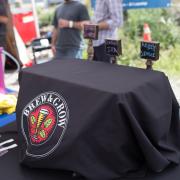Once upon a time in Amsterdam, I visited a bar called the Arendsnest that featured 30 Dutch beers on tap. There I had the privilege of tasting a dark, rich Eisbock, and this experience I cannot transmute into mere words - that night I was as close to a higher power as I have ever been in my life. It was better than acid. My biggest brewing dream is someday to make that very Eisbock.
At this juncture my brewing experience is minimal and I want to be realistic by starting out with Bocks, Doppelbocks and other German lager styles. In my research on these styles, I learned that traditionally brewers would increase the temperature of their mash step by step with a method called decoction mashing. Some of you probably know this method was used back before accurate temperature readings were a thing, and brewers just wanted to get the most out of their grain for reasons they didn't understand like we do today.
I'm interested in your takes. Has anyone brewed these styles or other German lagers with decoction steps? Has brewing the same style via step mashing or a single temperature mash yielded noticable differences? Have you done it at the Chaos facility? Is it difficult?
Thanks--
Kelsey









Hi Kelsey.
Decoction mashes are definitely possible at CHAOS and not any more difficult at the brewhouse than for someone brewing at home. You scoop out some of your mash and heat it up on the stove, then mix it back in. Easy-peasy, just requires time.
Decoction will provide more malt complexity and melanoidan flavors in your final beer. Like most things in brewing, there are multiple paths to get to that destination - using melanoidan malt, for example.
Doing step mashes in cooler mash tuns is possible, but more complicated and not as precise as in a mash where you can apply direct heat. One of the reasons to do a step mash is to increase efficiency, which many homebrewers don't care about anyway, because its about economics not the quality of the finished beer.
So decoction at the brewhouse - yes. Step mashes - no (unless you're using the tower of power). At least that's my take.
As for styles, I'd experiment and see what you think. I just brewed a Marzen, using melanoidin malt and no decoction. Its for an Oktoberfest event this autumn, where I'll be one of two or three people who will notice or care - so it didn't seem worth the extra time needed.
One style I would only brew with a decoction is the Czech Premium Lager - a Czech Pilsner. The malt in that style is so important.
One style I probably wouldn't decoct is a Helles. The Pilsner malt quality that is the hallmark of the style doesn't require the melanoidans that a decoction gives you. That being said, I'm sure there are brewers who decoct and make delicious Helles. YMMV, as always.
www.singingboysbrewing.com
Kelsey,
I do step mashes at CHAOS using one of the brew stations as a mash tun. Some extra equipment is needed such as a flase bottom, a pump and a sparge arm. If you'd like to collaborate on a brew together let me know. I've been brewing German Beers for the last year working my way through the BJCP style guide. Lagers & Ales.
LMK
--james
You can do step mashes in a cooler mash tun without that stuff by doughing in thick (~0.8 qts water per pound of grain) and using boiling water to raise to the next step(s).
You can use the rest calculator on this site: https://www.rackers.org/calcs.shtml to calculate the amount needed based on your grain bill and the temperature you need to hit.
That said, I'm in Jim's camp. I've done it, and don't notice enough positive difference (right now) to justify the effort it takes. I should do a true side-by-side, though, but overall I'm pretty lazy!
I think there are important distinctions between decoction and step mashes. I’ll let decoction comments from Jim and Kyle stand.
It’s true, step mashes may be unnecessary or only marginally noticeable, depending on whom you ask. It is absolutely not beneficial for most beer styles. But I still do step mashes for some of my Belgian beers, mostly wits and saisons. I recall the Metropolitan guys said they do a 2-step mash for (some) lagers.
For me the idea is to create a more fermentable wort to produce drier (per style) beers with better head retention. I think it produces better beers (certainly much higher efficiency) and I enjoy the more hands-on mash vs. sit-and-wait single infusion.
You can step mash in the kettle without extra equipment, you just have to closely monitor and stir constantly during the temp rises (usually ~5F/min.)
Yes, I got caught up in the weeds, there. While decoction is a form of step mashing, it is definitely not just step mashing.
See, this is what's so great about brewing handmade beer - people make excellent beer using a variety of processes. We're all in this for slightly different reasons, we have different life contexts, and our brewing arcs don't all match up. But I can tell you for a fact that Kyle, James and Sean all make excellent beers. Cheers!
www.singingboysbrewing.com
You can achive the malty + melanoidin with a shift in grain bill, therefore not needing a decoction match. I mash on the middle burner with the recirculation mash setup so I can finetune mash tem and do mash steps.
And as Jim has put it above... It doesnt really matter what technique you used to create the beer as long as you hit and deliver on all the expected beer charicteristics. Color/clarity, aroma, bitterness and taste.
There are no extra points give for degree of pain it took you to brew said beer. One time I made a Smoked Porter from 2 row that I malted and smoked my self. I started with base 2-Row, Kilned all the way up to Black Patent.
These are fun experiments, but there are easier ways to get to the finished product.
--james
An add on question to the beervana experience. My understanding of these two mash processes:
Decoction: Take out part of the mash and bring it to a boil then add it back into the mash tun to get it to each desired temp
Step mash: Gradually increase heat to bring entire mash up to each desired temp
It sounds like either way works just as well and is limited to your preference. During a decoction mash, would enzyme activity stop for the remainder of the mash for any grain that was brought to a boil before being added back into the mash?
They both can be used to hit different mash 'steps' but decoction has a lot more going on than that, more than just what temps activate what enzymes. The mash is caramelizing, I guess would be one way to put it, lots of maillard reaction.
www.singingboysbrewing.com
Step mashing is basically a method of doing your mash (the alternative being single infusion).
Decoction is a cooking method through which you can raise the temperature of your mash in order to peform a step mash. You can also perform a step mash using multiple infusions of hot water, or by using a recirculating system with a heating element (Tower of Power at the clubhouse).
As for being able to simulate the characteristics of a proper step mash using melanoidin malts/munich malts, I would say it comes down to your tolerance for flavor.
As Jim mentioned, enzymatic activation is a key component of a true step mash (whether accomplished through multiple infusions, recirculation, or decoction. The key here is that going through a step mash generates 2 very important things, ferulic acid and glycoproteins.
Ferulic acid is consumed in fermentation, and helps to tame the ripe fruit esters in weizen-style yeasts, as well as tank the ph of pale grist.
Glycoproteins are generated through a pretty involved process by which you have to do both a protein rest at 125 and eventually take the mash all the way through the oligosaccharide mash at 160. If you actually do this the right way, that's how you get lager beers with soft pillowy head that lasts forever without having to YOLO the carb level in the beer. In my experience, there isn't really a good way to accomplish this, even though the addition of maltodextrin.
Now, the real question is, does any of this actually matter? We leave that as an exercise to the brewer...